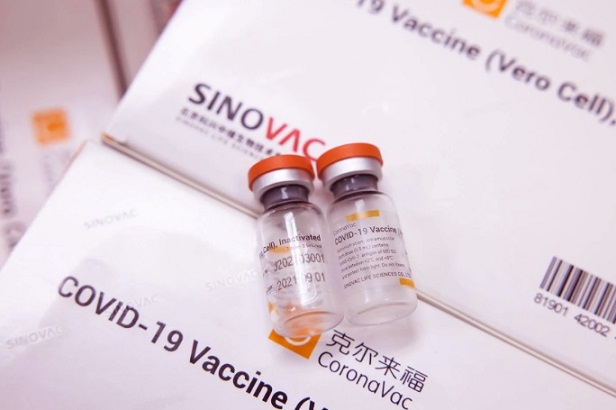Spike in Blood Protein Levels After Inactivated COVID-19 Vaccines Sparks Health Concerns
Nikhil Prasad Fact checked by:Thailand Medical News Team May 04, 2025 9 months, 4 weeks, 23 hours, 18 minutes ago
Medical News: A new Chinese study has raised eyebrows by revealing that a vital blood protein known as fibronectin shoots up significantly after people receive inactivated COVID-19 vaccines — and the surge in levels may last for over six months.
 Spike in Blood Protein Levels After Inactivated COVID-19 Vaccines Sparks Health Concerns
Spike in Blood Protein Levels After Inactivated COVID-19 Vaccines Sparks Health Concerns
The research was carried out by scientists from The First Ward of Internal Medicine and The Second Ward of ICU at the Public Health Clinical Center of Chengdu in China. It monitored both healthy individuals and COVID-19 survivors who received the widely used inactivated vaccines like CoronaVac (by Sinovac) and BBIBP-CorV (by Sinopharm). This
Medical News report looks deeper into what the researchers found and why the results may matter more than we think.
What Did the Study Involve?
The prospective study enrolled 74 adult volunteers in total: 40 healthy participants and 34 individuals who had previously recovered from COVID-19. Each received two doses of an inactivated SARS-CoV-2 vaccine, followed by a booster shot for healthy participants. Blood samples were taken before vaccination, six months after the two primary doses, and another six months after the booster dose.
Researchers closely monitored various health indicators, but fibronectin (FN) — a protein involved in wound healing, blood clotting, and inflammation — became the main focus due to its unexpected and consistent rise after vaccination.
Key Findings of the Study
The results were striking. In both healthy people and COVID-19 survivors, fibronectin levels rose sharply after two vaccine doses:
-Among healthy donors, FN levels rose from 314.30 mg/L to 467.35 mg/L (P < 0.001).
-In COVID-19 survivors, levels increased from 375.79 mg/L to 548.12 mg/L (P < 0.001).
-Six months after the booster shot, healthy donors saw FN levels jump even higher to 569.90 mg/L (P < 0.001).
Even more startling was the rate of abnormal FN levels. Before vaccination, only 5% of healthy individuals had elevated FN. After six months, that number jumped to 85%. Among COVID-19 survivors, elevated FN was found in 94.1% six months after vaccination, up from 29.4% before the shots.
Interestingly, the spike in fibronectin was not tied to changes in other clotting-related blood markers such as D-dimer or fibrinogen. That suggests the rise in FN could be a unique immune or inflammatory response to the vaccine — one whose long-term effects remain unknown.
What Is Fibronectin and Why Does It Matter
Fibronectin is a crucial structural protein found throughout the body, involved in everything from cell movement to tissue repair. But elevated levels have also been linked to dangerous conditions like cancer, liver fibrosis, stroke, and even blood clots.
Past research s
howed that severe COVID-19 itself can increase fibronectin — especially a type called EDA-FN, which promotes inflammation and thrombosis. Some survivors in this new study still had elevated FN even a year after infection, suggesting a lingering immune disturbance.
Should You Be Worried
While the study clearly shows that FN levels spike after vaccination and remain elevated, the big unknown is whether this poses any actual health risks. No direct complications were observed during the study period. However, since FN is involved in clotting and inflammation, experts urge caution.
The researchers note that the use of aluminum hydroxide as an adjuvant in these inactivated vaccines could be one factor, although there is no direct evidence linking it to fibronectin spikes.
Final Thoughts and What Comes Next
The study highlights the need for longer-term monitoring of vaccine recipients and more research into lesser-known biomarkers like fibronectin. With over 80% of subjects still showing elevated levels half a year after their last dose, it’s clear that the body’s response to vaccination goes deeper than antibody production alone.
These findings point to a need for broader investigations across different vaccine platforms and populations. Understanding whether elevated FN has real-world health impacts is crucial, especially for those already at risk of clotting or inflammatory conditions.
The study findings were published in the peer-reviewed International Journal of General Medicine
https://www.dovepress.com/serum-fibronectin-levels-increased-significantly-following-the-adminis-peer-reviewed-fulltext-article-IJGM
For the latest Vaccine News, keep on logging to Thailand
Medical News.
Read Also:
https://www.thailandmedical.news/news/study-finds-that-covid-19-infection-and-vaccines-are-causing-blood-cancer-patients-to-relapse-faster
https://www.thailandmedical.news/news/sars-cov-2-spike-protein-detected-in-brain-arteries-of-43-8-percent-of-vaccinated-individuals-even-17-months-after-mrna-vaccination
https://www.thailandmedical.news/news/it-was-wrong-to-have-used-the-spike-proteins-in-the-covid-19-vaccines-as-they-can-elicit-many-kinds-of-pathogenic-autoantibodies
https://www.thailandmedical.news/articles/vaccine-news
https://www.thailandmedical.news/pages/thailand_doctors_listings
https://www.thailandmedical.news/news/glue-like-protein-may-be-key-to-drug-resistant-breast-cancer
